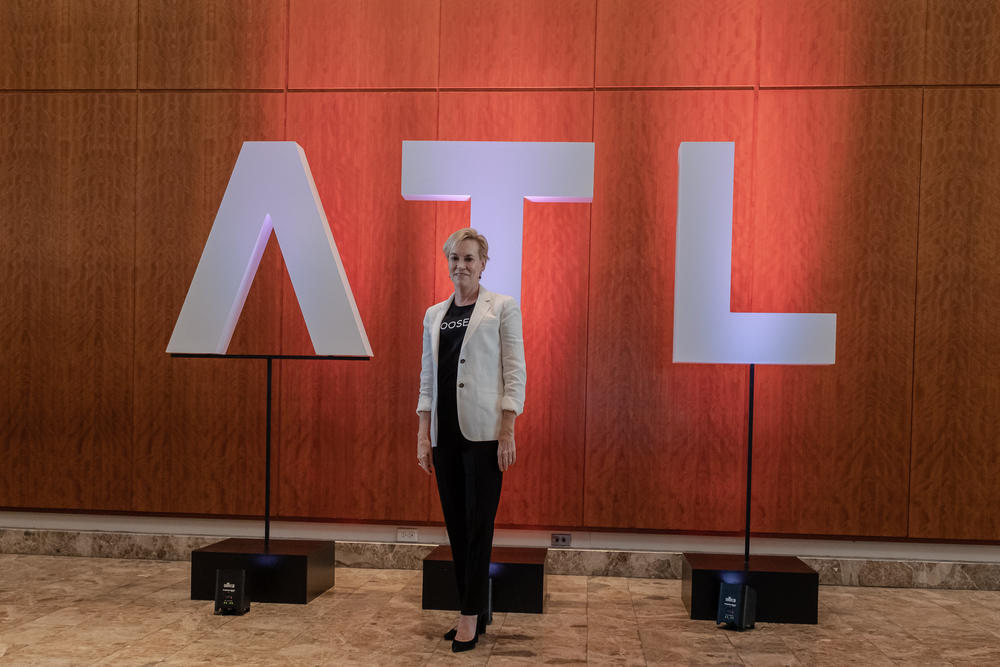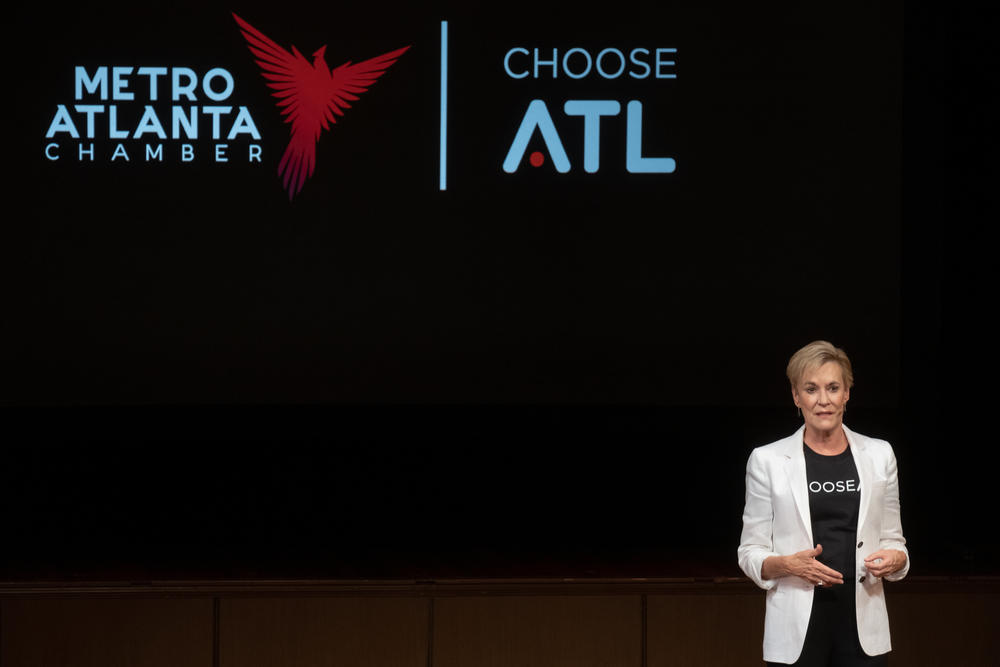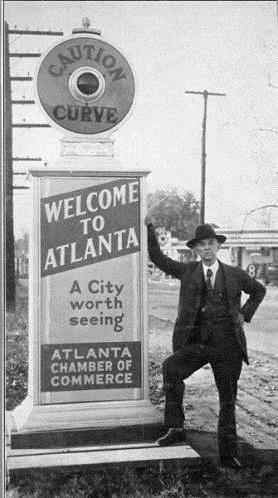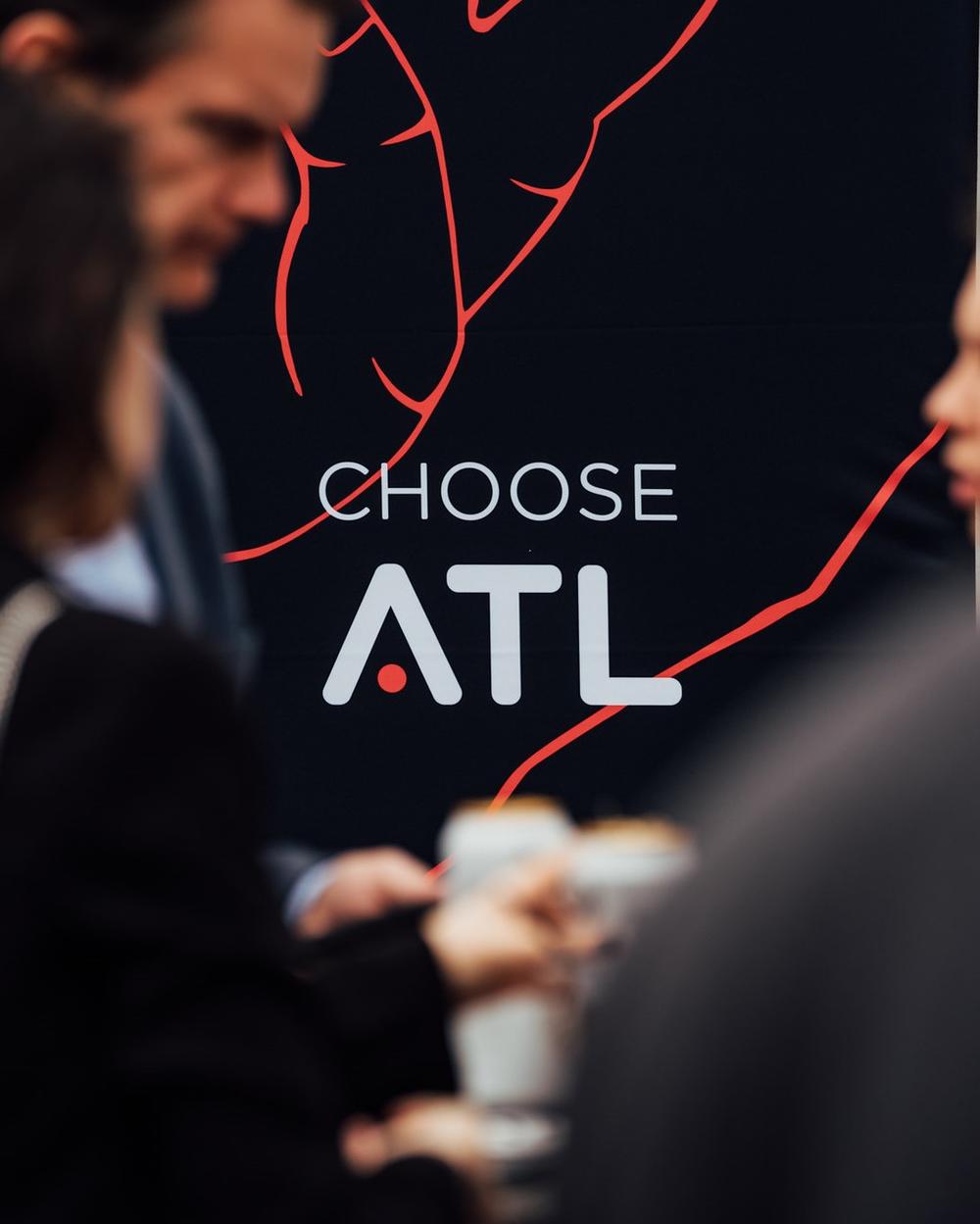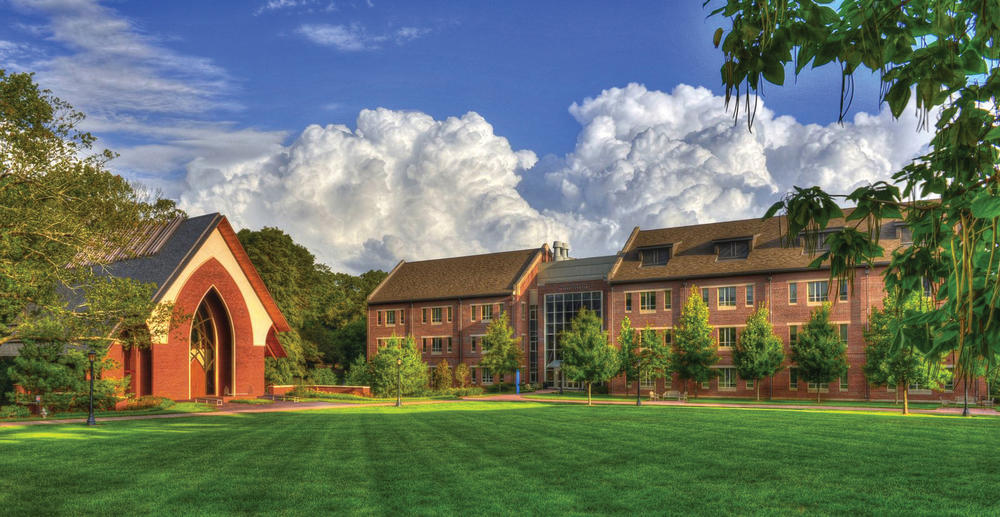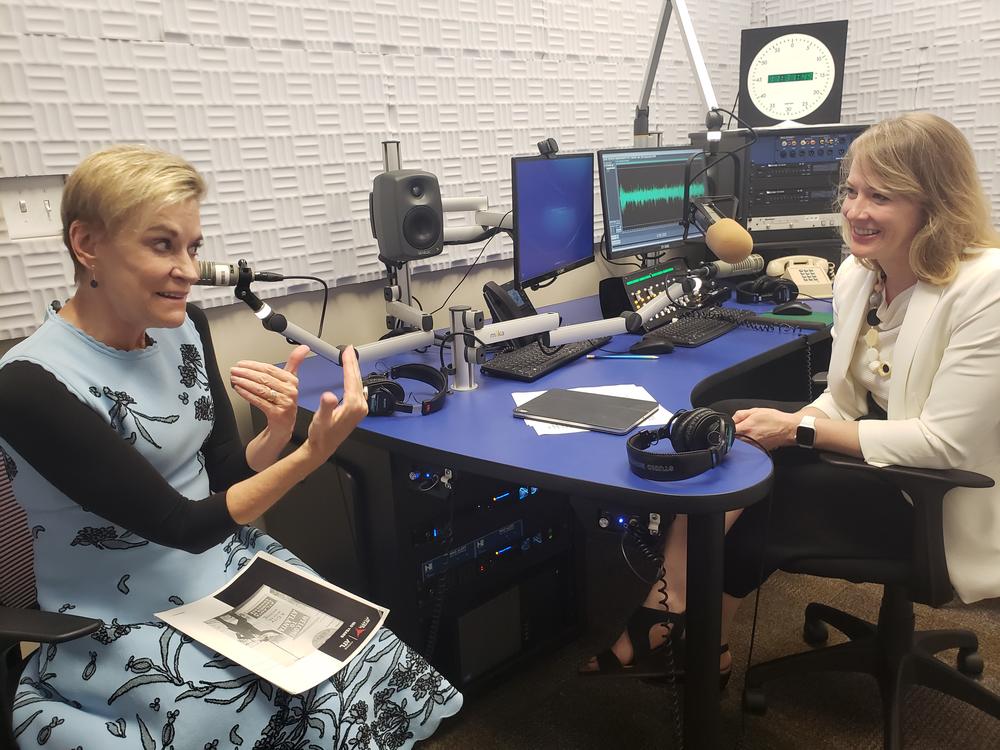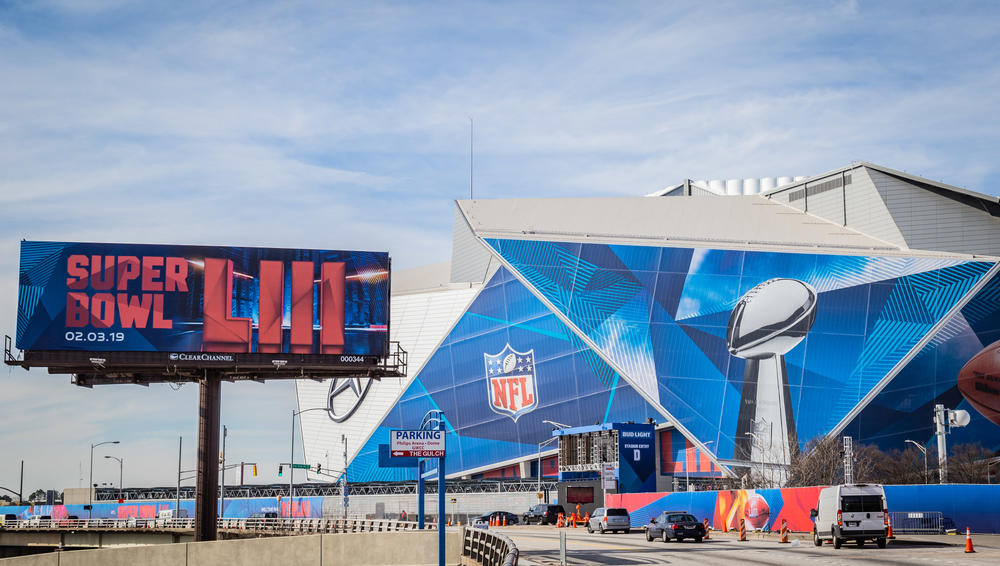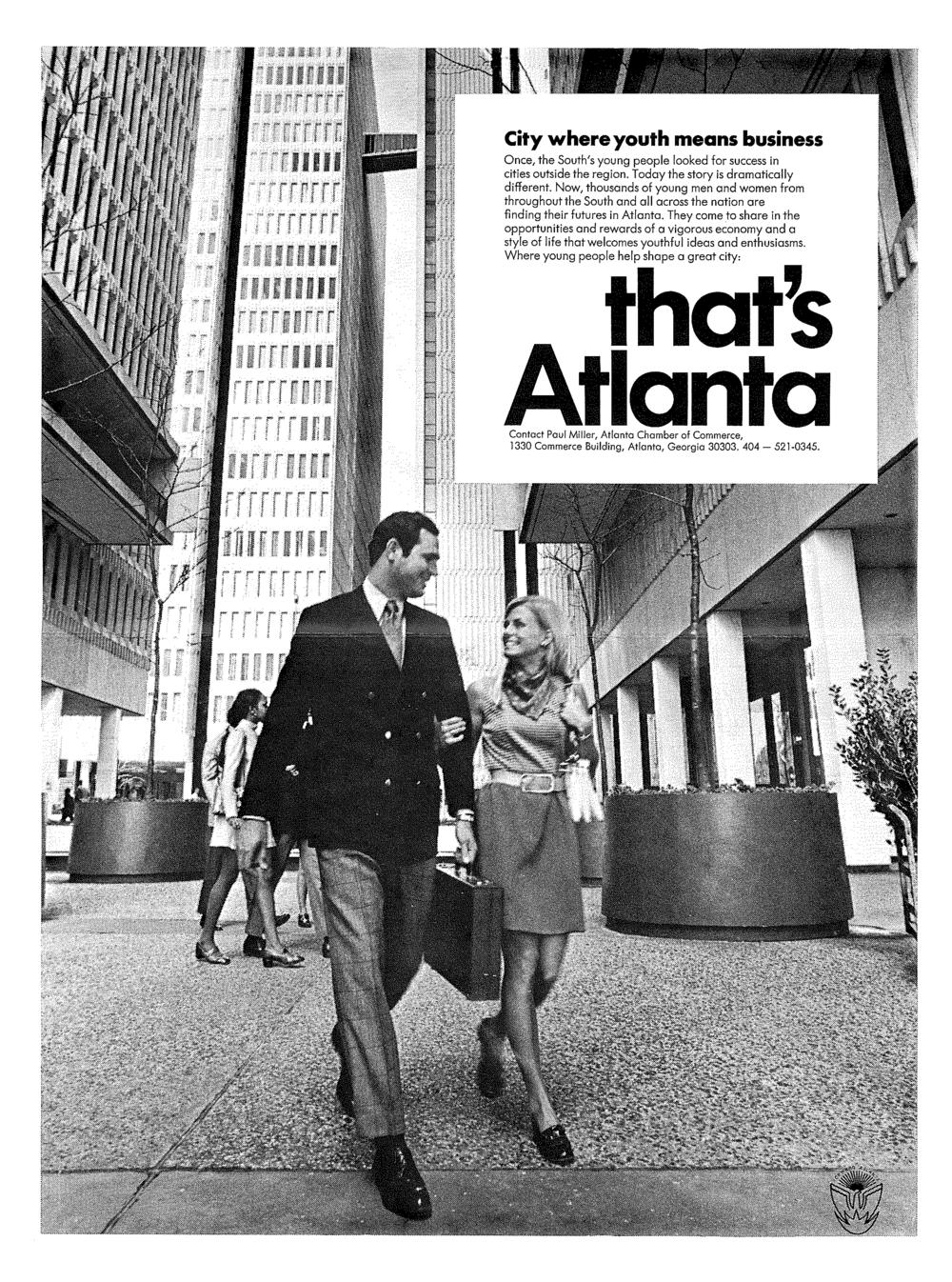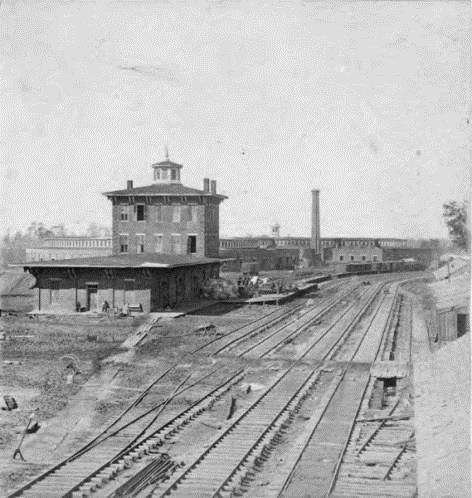Section Branding
Header Content
From Super Bowls To State Flags, Metro Atlanta Chamber President Reflects On 160 Years
Primary Content
The Metro Atlanta Chamber is marking its 160th anniversary.
For average Georgians who don't own a business, a chamber of commerce may not seem to impact our everyday lives.
In fact, the Metro Atlanta Chamber has a lot of influence over life in Georgia, ranging from our transportation options to attracting a Super Bowl to the design of our state flag.
GPB's Rickey Bevington sat down with Chamber President and CEO Hala Moddelmog to explain.
This conversation has been edited for clarity and conciseness.
Rickey Bevington: Whose interests does the Chamber represent?
Moddelmog: We are set up as a business organization, that part is true. But I like to think that we represent the average citizens because we do a lot of things around advocacy, public policy and things that really do affect people's everyday lives.
Of course, we do have the business focus. But businesses are made up of people and they're made up of employees. A lot of the things we work on have a really broad swath of influence.
Bevington: But in terms of your business model, it's member businesses of the Chamber?
Moddelmog: It is. It's businesses. In Atlanta, we're very fortunate. We have the third highest concentration of Fortune 500 companies, so we've got those really large companies that take very good care of us and our citizens. And then [we have] 29 Fortune 1000 companies, so probably around 1 million constituents are represented by these companies that are members of ours.
Bevington: How about small businesses?
Moddelmog: Small businesses are there too, but I will tell you it's mainly those entrepreneurial businesses that are scaling, a lot of the technology companies that are scaling because they're looking for customers. That's primarily our focus on the small business side.
Bevington: On what aspects of life in Georgia does the Metro Atlanta Chamber focus its energy and influence?
Moddelmog: The two or three things that we have focused on for a very long time are education, transportation and transit and just access to what people need in the market. We want a quality of life here where's there's no competition for it. That's what we want.
We want places that are good to live in from a cultural standpoint, where we're an open society, where people are welcomed here and where they can have a great cost of living and a great job.
Bevington: According to the Chamber, 40,000 millennials moved to metro Atlanta from a different state last year. Gen Z represents 27% of the area population.
If you had to prioritize, what are the most important ways that Georgia businesses need to adapt immediately in order to attract and adapt to a changing workforce?
Moddelmog: Well, it's interesting. I was on a panel the other day, and someone asked me, "What do you think about millennials?" And I was like," Do I think they exist?" The question itself implied that there was something wrong with millennials, and I am here to tell you there is nothing wrong with millennials and there's nothing wrong with Gen Z.
They represent our future. They're smart. They're passionate. They want things to move and, frankly, they represent over 50% of the workforce in most cases and larger in some others.
So we need to make sure as baby boomers and people who are CEOs and Gen X that we recognize, appreciate and make sure these next generation talent gets educated, that they want to work for us and furthermore, that they want to live in Atlanta. Because of our rich culture, we have a lot of people wanting to live in Atlanta.
Bevington: As for attracting new businesses, however, our state and cities are handing out ever-larger tax subsidies to private enterprises, controversially in some cases: Georgia's failed bid to bring Amazon's new East Coast headquarters and more than a billion dollars to be given over to redevelop the Gulch in downtown Atlanta. That tax handout is still in court.
Does the Metro Atlanta Chamber anticipate a time when billion-dollar tax subsidies are no longer politically tenable?
Moddelmog: You know, it's interesting. I do believe that the Amazon project, and not just in Atlanta, but across the nation, called a lot of attention to incentives, and it's probably OK. People deserve to understand how incentives are used and how they're not. In my personal opinion, there are some times that they are absolutely appropriate. The Gulch, being one, because we had to have that hole in the ground raised up before anything could be built.
Then there's sometimes that there's a development that doesn't need any incentives. So I think people have to take a step back and understand what are the projects that won't happen without an incentive and what are the projects are going to happen anyway.
Bevington: The Amazon bid forced Georgia to take a look at itself. What did we learn from that bid process?
Moddelmog: As much as I didn't like the way Amazon handled their process, I thought it was a little unusual and maybe a little taking advantage of people, if I might...
Bevington: What do you mean by that?
Moddelmog: When they went out to the whole world and had a lot of people doing a lot of work, it was a little bit, I think, beneficial to themselves to get a lot of data on a lot of markets. But that being said, it was really an incredibly wonderful exercise for us because the state of Georgia along with Georgia Power and other people who were in on this bid with us.
We did take a really hard look at ourselves, and we found some things that are really great that we didn't even know. Then we found some areas that we wanted to work on. I do admire the questions they asked and what they tried to understand about our community. It was a good exercise.
Bevington: So if you had to say one big takeaway that you think we're going to have to grow into, would you give me an example?
Moddelmog: I'll tell you what has been just a wonderful outcome of that. Our communications group and our economic development group worked really hard to get our act together on our marketing materials, things like talking about next-gen talent, things like talking about our culture, things like talking about our technology startups and how those three things I just mentioned really meshed together.
We created a pretty darn good marketing campaign for this region, and we've used it ever since.
Bevington: Can you tell me more about that?
Moddelmog: There are a couple of things that we've done. One is something called "ChooseATL.". We've had that for a few years, and we've really just sort of lifted that to the next level. Frankly, we had to because when we first designed it a few years ago, it was targeting millennials. It seems like just yesterday that was fine, and now it's got to be millennials and Gen Z.
I'm a baby boomer. We have quite a few Gen Xers in our office, and I'm proud to say quite a few millennials and Gen Zs. So we had to make sure that when we were recruiting companies, we can look them in the eye and say, "We are going to recruit the talent that you need to Atlanta and the talent that's already here."
They're going to stay because we have careers, we have community and we have culture. It's a very strong mix, and you just got to get the word out.
Bevington: When companies consider metro Atlanta, are they are they satisfied with the education level of the future workforce?
Moddelmog: It's pretty amazing. We are, if you really stop and think about it, in a phenomenal college town to use an old phrase. But when you talk about things like Georgia Tech, I'm just going to start there because people love to talk about engineers and technologists.
When you talk about the fact that Georgia Tech graduates more women engineers and more black engineers than any other school, that's a pretty big selling point because companies are coming here, not only looking for educated workers, but looking for diversity that they just can't find in other markets.
We have our four HBCUs. They have just set up a new data science center, and one of the things I love about that data science center they're setting up is that they are asking companies to tell them, "What do our students need to learn?" So there is a real connection to getting students educated for what the workforce needs, and that's a big deal. I could go on and on.
Georgia State graduates more black students than any other market. You talk about Emory, all the work they do there. And then I have to fit in Agnes Scott because they are a school where there's no majority there. There are women from all over, and they are ranked number one in social mobility, so the kids who go in there and come out young women they have gone up the ladder.
RELATED: Agnes Scott College Welcomes New President Amid Changing Campus, Identity
Bevington: The Metro Atlanta Chamber is not afraid of a difficult political fight. There are plenty of examples. The two I will mention are the Chamber's efforts to remove Confederate symbols from the state flag. That was the early 2000s and just as recently as 2016, the Chamber worked to defeat what's often called "religious" liberty legislation.
Why is it in the interest of companies for the Chamber to wade into political debates?
Moddelmog: We get right back to that talent attraction. People don't want to live in a market where they feel like they're not at all welcome.
We need to make sure that people feel comfortable living here and moving here to work. And our businesses want to be economically viable and growing all the time. I'm very proud of this business community because they do step up, and they will step up on tough issues.
Sometimes the Chamber is the one who steps out in front and helps the the companies have a tip of the spear. And then there are other times when our companies say, "Look, we want you there with us, but we're tip of the spear on this as well because these things really matter and they matter to our business. They matter to our employees."
It's very important to them to be a big part of this change so the two that you just mentioned are two that I'm frankly very proud of for the Chamber.
Bevington: Often these debates fall along urban/rural lines. You grew up in rural Georgia?
Moddelmog: Yes, I did.
Bevington: You went to Georgia Southern [University]. You went to the University of Georgia. You have a personal perspective on how Atlanta is viewed by other parts of the state. That's really important, I would imagine for your job.
So what happens when the Metro Atlanta Chamber finds itself at odds with, say, the Georgia Chamber or maybe a local Chamber of Commerce?
Moddelmog: We actually really stay fairly closely aligned with the Georgia Chamber. For instance, I think we're probably aligning with them 90% of the time.
I appreciate you're saying the bit about my background because I do try to take into consideration all of Georgia because rural Georgia is very important, and I care deeply about it. I have family who still live in rural Georgia, and I'd like to think that the vast majority of the things that we drive in metro Atlanta are good for the whole state.
Part of it is about jobs and, you know, our remit is 29 counties, and some of those can feel kind of rural, and so it is important to us to keep in mind the whole state and in everybody's view.
Some of our rural communities have been left behind, and that's not alright. It's not alright with anyone living in metro Atlanta. I think people have a heart for the whole state, the whole nation and wish we could do more.
Bevington: I know our current state legislature and our governor is really stepping into that.
Moddelmog: Yes, and we're happy to help in any way and, interestingly, to your point about my background when I'm talking with the state legislatures from all over the state I can say, "Look, I grew up where you did, and I understand some of the issues, so let's just try to work on things that are helpful to everyone."
Bevington: The very influential Business Roundtable, just in August, made international headlines by announcing that it is redefining the purpose of a corporation. 181 CEOs signed onto a letter stating that a corporation should "promote an economy that serves all Americans."
This is a turn from corporations' raison d'être to make money for shareholders, right? What are you hearing from Georgia companies about this major change and how it might influence their organizations?
Moddelmog: Many of our Georgia companies did sign on to what the BRT just announced, and I have a couple of views on it. One, I was thrilled to hear it because I know, as do our CEOs, this is no secret, if you are not treating your employees right, if you are not doing what you need to do in the community and if you don't have a broader sense of caring in general, you're never going to be as successful as you can be.
Obviously, these companies are in the business to make money. Their shareholders are important and the way I've always viewed things when I was running a business is, "Look, we're going to make the numbers, we're going to make the money because then, we're allowed to do some of the other things."
And actually, it has flipped a little bit because with Gen Z and with millennials and the world being as fraught as it is sometimes, people understand that those things have to come first and along with making money, and they will drive making money.
Bevington: It really sounds like millennials and Gen Z are driving the future of the world's business.
Moddelmog: I think they're having an influence, and I welcome it. I think we've we've got to learn from each other. We have this new program that we're calling Plato, and we call it that because of the whole Socrates, Plato, Aristotle thing. The important part of that is that we want the mentorship to be going up and down.
There's a lot that the baby boomers can learn from the younger generations, and there's a lot that the younger generation can learn from baby boomers. We like to think that there should be more sharing and people doing things together.
Bevington: When the Chamber was founded 160 years ago, it was really to protect railroad interests which is the founding of the city of Atlanta. What do you think those guys would say to you today?
Moddelmog: That's a great question. I think they'd probably be a little bit flabbergasted, frankly, because that was a long time ago as you know. I think their interests were probably very pure. I would think they'd say, "Wow, you guys have taken on a lot of social issues." I think if they also took a look at more history in more general terms that they would understand that those social issues had to be addressed. If Atlanta hadn't addressed them, we wouldn't be Atlanta today.
It's just a really really big deal, so I think it might take them back a little bit. But the once they thought about it, they would understand that the things that we've done outside of just your plain, as they would say, "mercantile" type of activities have been very, very important for this market.
Hala Moddelmog is a member of the Georgia Public Telecommunications Commision Board. It oversees Georgia Public Broadcasting.
